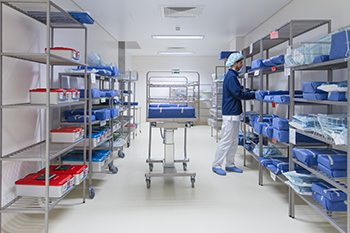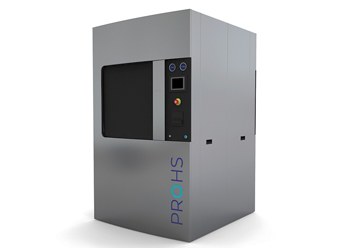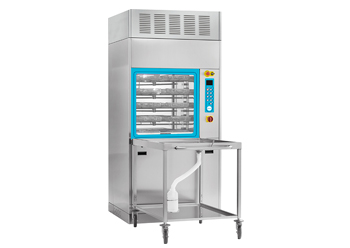
PROHS designs, produces and installs central sterile services departments to meet the requirements of each hospital or clinic.
State-of-art equipment for CSSD from PROHS
01 February 2020
Oman International Hospital represents a milestone in the healthcare sector for the Gulf region, according to PROHS, which will be supplying all the equipment for the Central Sterile Services Department of this state-of-the-art private hospital in Oman.
The Portugal-based company, which has been active in the Middle East since 2007 with healthcare facilities such as the Bahrain Specialist Hospital in Bahrain in its portfolio, will be supplying a range of equipment to Oman International Hospital including steam sterilisers, instruments washer disinfectors, plasma sterilisers, sealing machines and stainless steel furniture (washing and packing tables, trolleys and shelves).
“PROHS stands out for its ability to design, produce and install central sterile services departments adapted to the needs and requirements of each hospital or clinic,” Milton Rodrigues, operations manager of PROHS, tells Gulf Construction magazine.
 |
|
PROHS offers a diverse range of medical equipment. |
The company, which covers all the needs of a central sterilisation service department (CSSD), specialises in developing and manufacturing disinfection and sterilisation equipment for hospitals and laboratories. Its range of products includes sterilisers (steam and plasma), instruments washer disinfectors, sealing machines and stainless steel furniture.
It can also supply equipment for other hospital areas, such as bedpan washer disinfectors and stainless steel furniture for sluice rooms; and furniture including special trolleys, transfer and instrument cabinets and surgical sinks for operating theatres.
According to PROHS’ sales consultant José A Guedes, the Oman International Hospital project called for the setting up of the ideal CSSD for its designated location.
“This is what we do for most of our projects; we must match the available area for the service with the needed capacity. To do so, we consider the size and configuration of the hospital, the number of beds, the number of existing operating rooms, as well as the total number of operations performed or expected by day and by type of medical specialty. This information is essential for us to evaluate the volume and size of equipment needed,” he explains.
“The CSSD plays a key role in infection control in the hospital; therefore, our project team must consider national and international recommendations to ensure the best possible design, workflow, and safety of staff and patients,” he adds.
 |
|
PROHS washer disinfectors will be supplied to the Oman International Hospital project. |
At the Oman International Hospital, PROHS will be responsible for installation, testing and training of users and the technical team that will take care of the first-line maintenance. PROHS’ technical team will be responsible to draw up the preventive maintenance schedule.
PROHS is currently beginning the internal procedures to start the production of the order for the hospital.
Outlining some of the challenges of the project, Rodrigues says: “The main challenges were the physical barriers. The designated area for the CSSD is located between two main internal circuits and for this reason, we had to re-design it to ensure good workflow and ease of transportation and delivery of necessary supplies. We are also giving special attention to access to and from the CSSD, since the equipment to be installed has large dimensions.”
Following a number of discussions, PROHS developed different versions and, together with a multidisciplinary team from Oman International Hospital, drew up a CSSD plan that complies with the standard rules and with the right medical device reprocessing procedures.
Commenting on the project, he says IdealMed is known for the highest standard of care, using the latest medical technology, and PROHS is proud to be part of this project.
PROHS traces its origins back to 1967 when José dos Santos Monteiro (JSM) was set up to manufacture and distribute hospital furniture for operating rooms. PROHS was founded in 2000 in an effort to modernise the company’s image, with responsibility for the distribution of the JSM brand. PROHS then acquired 55 per cent of the José dos Santos Monteiro Ltda, gaining control of both production and distribution and subsequently aimed to spread its wings globally.
Last year, the company recorded its best sales ever and Guedes says PROHS expects to register an even better performance in 2020.
“PROHS’s major focus is to deliver the best experience to users of our equipment. As an example, to make our equipment more user-friendly, we have our software translated in several languages – our steam sterilisers can be operated in Arabic, for instance,” Rodrigues points out.
PROHS is certified to NP EN ISO 9001:2015 standards for quality management of the organisation and ISO 13485:2016, a quality management system for medical device manufacturers.
Ongoing investment in research and development (R&D) allows PROHS to keep its products up to date and competitive, ensuring its equipment can be adapted to the demanding needs of the medical sector.
Three months ago, PROHS launched Smartlink, a supervision software that allows the user to work with the steriliser remotely from a personal computer. Smartlink also saves a history of cycles and when connected to a network will enable the company’s technical team in Portugal to check the status of the unit.
“We have also launched a new futuristic design for our horizontal steam steriliser; we want our customers to know we are at the forefront in sterilisation equipment sector,” Rodrigues states.
Its research and development department is now focusing on making the company’s equipment even more environment-friendly, by reducing the water and electricity consumption.
“All these key factors, plus more than 50 years of accumulated know-how and a rigorous product certification process have enabled PROHS to be an international reference in the sterilisation market, with products installed in more than 50 countries in the five continents,” Guedes remarks.
The company has been active in the Middle East since 2007, with many projects in the region, some of its latest being Bahrain Specialist Hospital in Bahrain; Qena University Hospital in Egypt; various hospitals in Basra, Iraq; and Islamic Hospital and Lebanon Italian Hospital in Lebanon.
- UD Trucks posts solid growth in Meena region
- Volvo paver promises high productivity
- Geberit tools support sanitary planning
- State-of-art equipment for CSSD from PROHS
- Condair expands dehumidifier range


